Darul Huda Islamic University: The Niche of Educational Reform in South India
The postulation of Darul Huda Islamic University (http://dhiu.in/ ) as an integrated education hub came to form at a time when the most influential Masjid-centralized religious teaching pedagogy gradually deteriorated, and socio-religious values became timid of stable existence of religious education amidst the overwhelming dominance of science and economy. Even though many expert traditional scholars have emerged, the absence of capable personalities to critically engage with modernity and effectively exchange knowledge through innovative methods, transcending the linguistic challenges became a bleak question for many.
Seeking the solution to these challenges paved a way for the establishment of Darul Huda as a new system encompassing all traditional values, yet designed for the reception of practicable reformations. Inauguration of Darul Huda as an outcome of the persistence of Dr. U Bapputty Haji, M.M Basheer Musliyar and C.H Hydrose Musliyar, the pioneers of Sunni Mahallu Federation, turned out to be a milestone in Kerala model of religious education. It was a herculean task to introduce society a new model of education that varies from the traditional trajectory they have experienced so far.
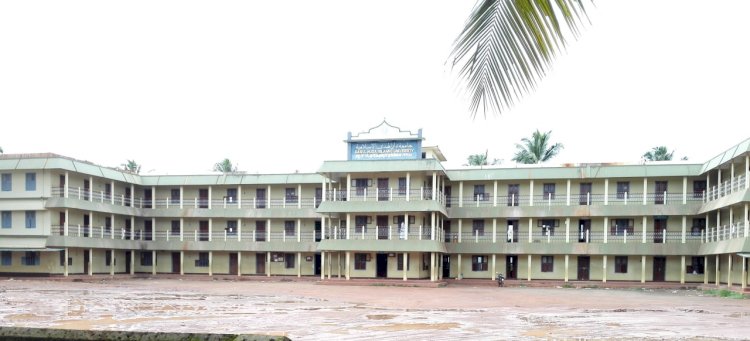
Secondary Institution, Darul Huda
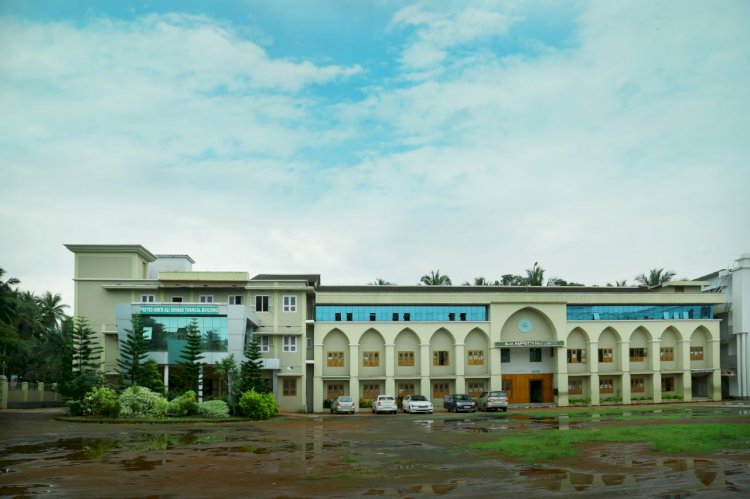
Dr. U Bapputty Haji Library
The manifestation of Darul Huda education system resolved as much as possible deficiencies that were affecting the prior-integrated curriculum, implemented by M.M Basheer Musliyar at Rahmaniyya Arabic College, Kadameri in early 1970s. Darul Huda envisions a comprehensive methodology that emphasizes acquiring education and the resultant personal development and spiritual purification. The vital objective of this system was to revive the knowledge production that has been vanished from the Muslim world for a long time, and to create an academic atmosphere where the healthy debates and discourses are being held.
Despite the suspicious questioning and critical analyzing of the public towards the significance of such an institution, prayers, and wholehearted supports from great visionary scholars such as Sayyid Muhammad Ali Shihab, Shamsul Ulama E.K Abubaker Musliyar and Kottumala Abubaker Musliyar fueled up the drastic changes in Darul Huda. Standing apart from the traditional scholars whose educational interventions were merely confined to their regional surroundings, the trailblazers of this system dreamt of shaping a scholastic community who have perceived the efficient knowledge and practical skills to play a key role in knowledge transmission, regardless of regional linguistics limitations. The communal leaders were conscious of the prominence of pervading the ideology of Samastha Kerala Jamiyyathul Ulama all over the nation. Compulsory incorporation of the Urdu language in the syllabus also opened new chances for Islamic propagation and knowledge exchange in various states other than Kerala.
Within 36 years of erection, marking its own distinctive position in the knowledge explosion, Darul Huda is progressing radically towards its objective of being peculiar, exhibiting substantial reforms in the whole education system. The institution is eagerly practicalizing innovative methods in both physical infrastructure and technical facilities. Darul Huda was upgraded as a university in 2009. In due course, Darul Huda acquired its membership in the League of the Islamic Universities, Cairo, and later the Federation of the Universities of Islamic world, Morocco.
So far, Darul had constituted academic collaboration with more than 12 International Islamic Universities, which comprehends International Islamic University of Malaysia, al-Qarawwiyin University of Morocco, Sultan Sharif Ali Islamic University of Bruno, University of Ankara, Turkey, and Islamic University of Rotterdam in the Netherlands. At the same time, National universities such as Jamia Millia, JNU, and Maulana Azad National University have also concurred on the validation of Darul Huda curriculum.
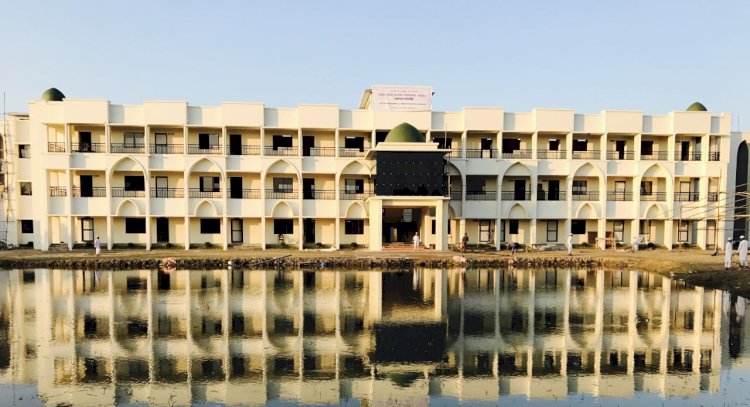
Darul Huda West Bengal Campus
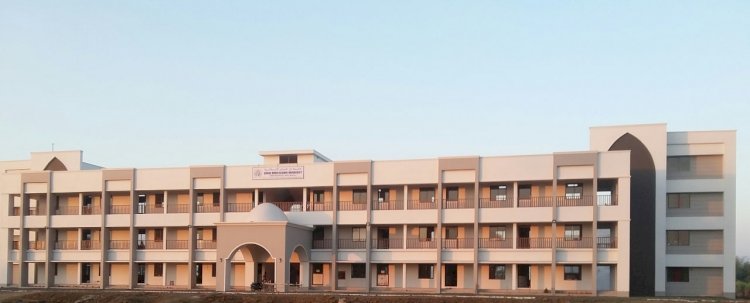
Darul Huda Assam Campus
Darul Huda’s educational system embodies Secondary, Senior Secondary, six departments in Degree and ten in postgraduation, senate, syndicate, academic counsel, and Board of Studies. A national institute was established for non-Keralite students in 1999. The consciousness of leaders, erecting different independent campuses should break the ground for centralizing propagational activities in various states drove them to build off-campuses in Northern Karnataka, Assam, Andra Pradesh, and Bangal and the construction works of Vadoli, Maharashtra are in final stage of completion.
Divergent proposals under Hadia, the alumni association of Hudawi graduates, including the establishment of primary educational centers, Model-Mahallu village, designed for educational, social empowerment, are on the verge of implementation. It is highly expected that the changes are gradually influencing society from the very grass-root levels. As women are supposed to be playing a major part in social development, courses of Zahrawiyya and Mahdiyya project on moral development and religious discipline of women. The chances for understanding Islam regardless of age, gender limitation, is creatively organized under CPET, (Central for Public Education and Training).
There are 9881 students on 38 campuses, located both in Kerala and other states. 4250 learners under public education initiative, 89,740 learners in twelve states under Hadia. These instances all denote the fact that about one lakh and more are still acquiring knowledge under Darul Huda and its different initiatives. Several courses are executed successfully even in non-Arabic countries by Hadia. The institutional management and Hadia are co-acting vigorously to bring off the Darul Model all over the world.
Darul Huda witnessed three epoch-making programs that held from last November 30 to December 6th, Sibaq, the National Arts fest, in which more than 2000 students competed each other in various contests and the Convocational ceremony for those who completed two years of compulsory social service after completion of twelve-year Darul Huda course. In Sibaq, Darul Huda witnessed the exhilarating artistic exhibition and churning out the students’ caliber. It is quite intrinsic that any creative, fruitful initiatives will attract its own rivals. However, despite of paying attention to those slanders, Darul Huda is still striving to resuscitate its foundational objectives. Allah says:
{Invite (all) to the way of your Lord with wisdom and beautiful preaching; and argue with them in ways that are best and most gracious: for your Lord know them best, who have strayed from his path, and who receive guidance} (al-Naḥl: 125).
Abouth author:
Prof. Dr. Bahauddeen Muhammed Jamaluddeen Nadwi is the founding Vice Chancellor of Darul Huda Islamic University, Kerala, India.
Translated by:
Amir Shefin, Research Scholar, Darul Huda Islamic University
Disclaimer
The views expressed in this article are the author’s own and do not necessarily mirror Islamonweb’s editorial stance.
7 Comments
-

As Salaamu Alaikum, i am very impressed to see the activities and curriculum of Darul Huda Islamic University. And I am very proud as a parent of student of Darul Huda Islamic University. Actually, i want to express some idea for students' growth. All the Darul Huda Centre's of India, I am very impressed to see all these photos and video of school children's performance and activities. Actually I would like to express some opinion if you don't mind , in Darul Huda Karnataka centre is very good for caring children's, teaching methods, curriculum activities etc. And the main thing is language, they all learn Hindi, Kanada, Urdu, Arabic and English. In my opinion, if the school authority has strictly order to all the staff's for English language compulsory, and all the students' must speak the English compulsory will be better inside the classroom, inside the school campus. Yeah, while in Hindi class Hindi language compulsory, in Urdu class Urdu language compulsory, in Kanada subject class Kanada language compulsory, and in Arabic Class , Arabic language compulsory and rest of the time would be English like Baitussalam school Talagang.
-

As Salaamu Alaikum, i am very impressed to see the activities and curriculum of Darul Huda Islamic University. And I am very proud as a parent of student of Darul Huda Islamic University. Actually, i want to express some idea for students' growth. All the Darul Huda Centre's of India, I am very impressed to see all these photos and video of school children's performance and activities. Actually I would like to express some opinion if you don't mind , in Darul Huda Karnataka centre is very good for caring children's, teaching methods, curriculum activities etc. And the main thing is language, they all learn Hindi, Kanada, Urdu, Arabic and English. In my opinion, if the school authority has strictly order to all the staff's for English language compulsory, and all the students' must speak the English compulsory will be better inside the classroom, inside the school campus. Yeah, while in Hindi class Hindi language compulsory, in Urdu class Urdu language compulsory, in Kanada subject class Kanada language compulsory, and in Arabic Class , Arabic language compulsory and rest of the time would be English like Baitussalam school Talagang.
-

Darul Huda Punganur, the first campus of Darul Huda Islamic University (DHIU), holds historical significance as the foundation of the university. Located in Andhra Pradesh, it marked the beginning of the university’s expansion, which later spread to other regions across India. Despite the growth of additional campuses, Punganur remains central to the university's educational and cultural legacy
-

Thank you for pointing that out! Darul Huda Punganur is indeed the first campus of Darul Huda Islamic University (DHIU). Located in Andhra Pradesh, it holds historical significance as the starting point for the university's expansion. Over time, the university grew to include several other campuses,
-

DH PUNGANUR STUDENT
1 year ago
Thank you for pointing that out! Darul Huda Punganur is indeed the first campus of Darul Huda Islamic University (DHIU). Located in Andhra Pradesh, it holds historical significance as the starting point for the university's expansion. Over time, the university grew to include several other campuses
-
-

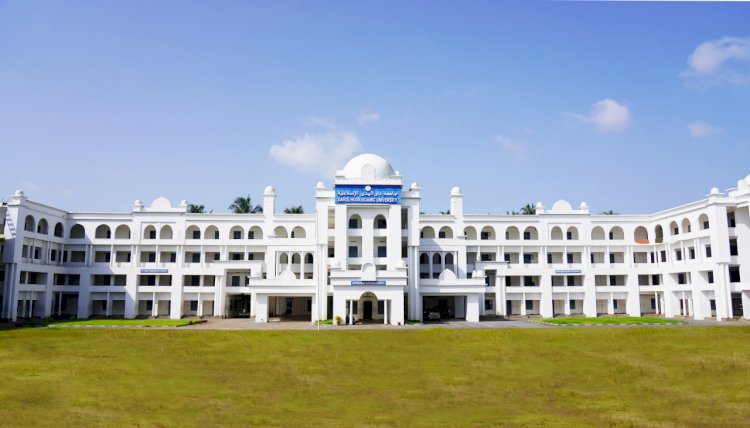


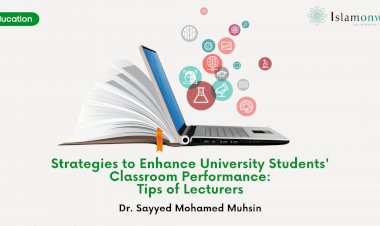
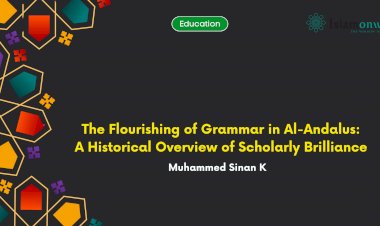
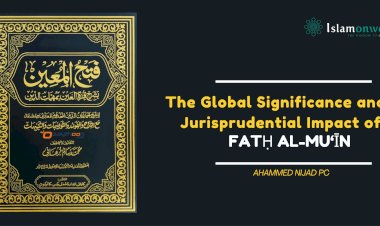
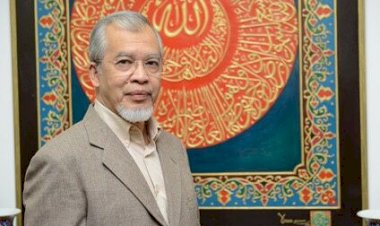

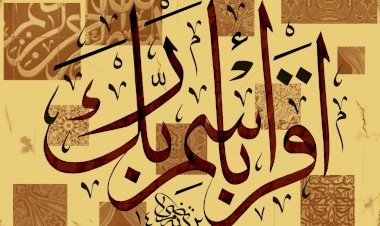














Leave A Comment